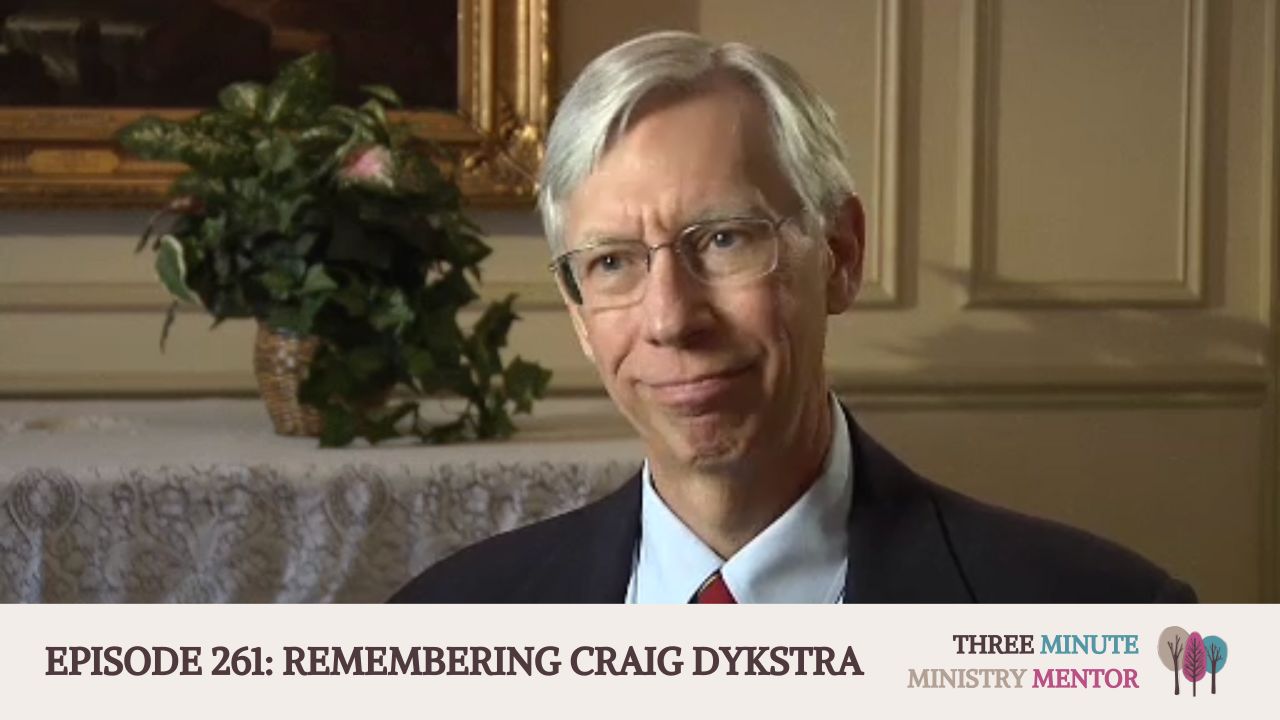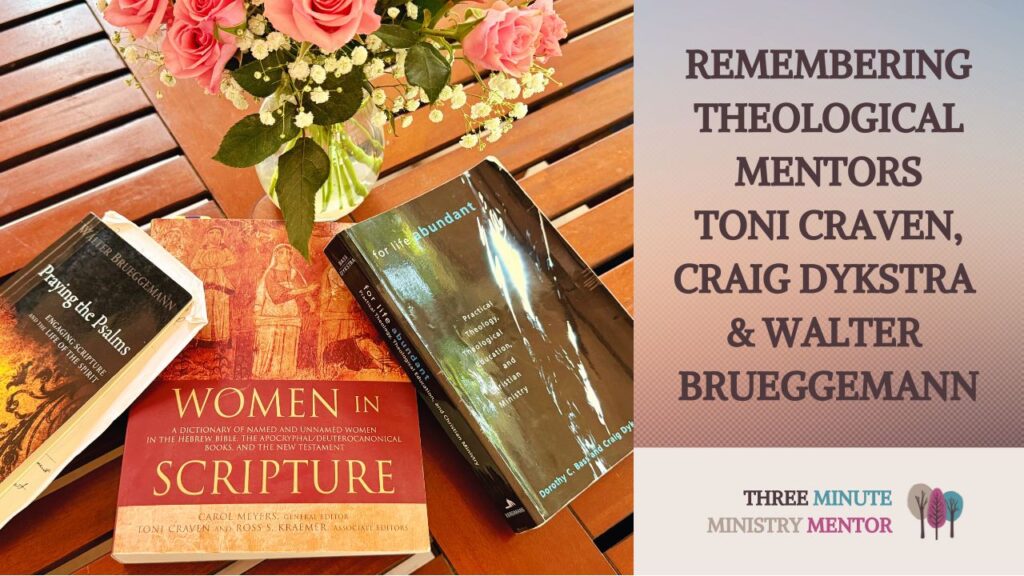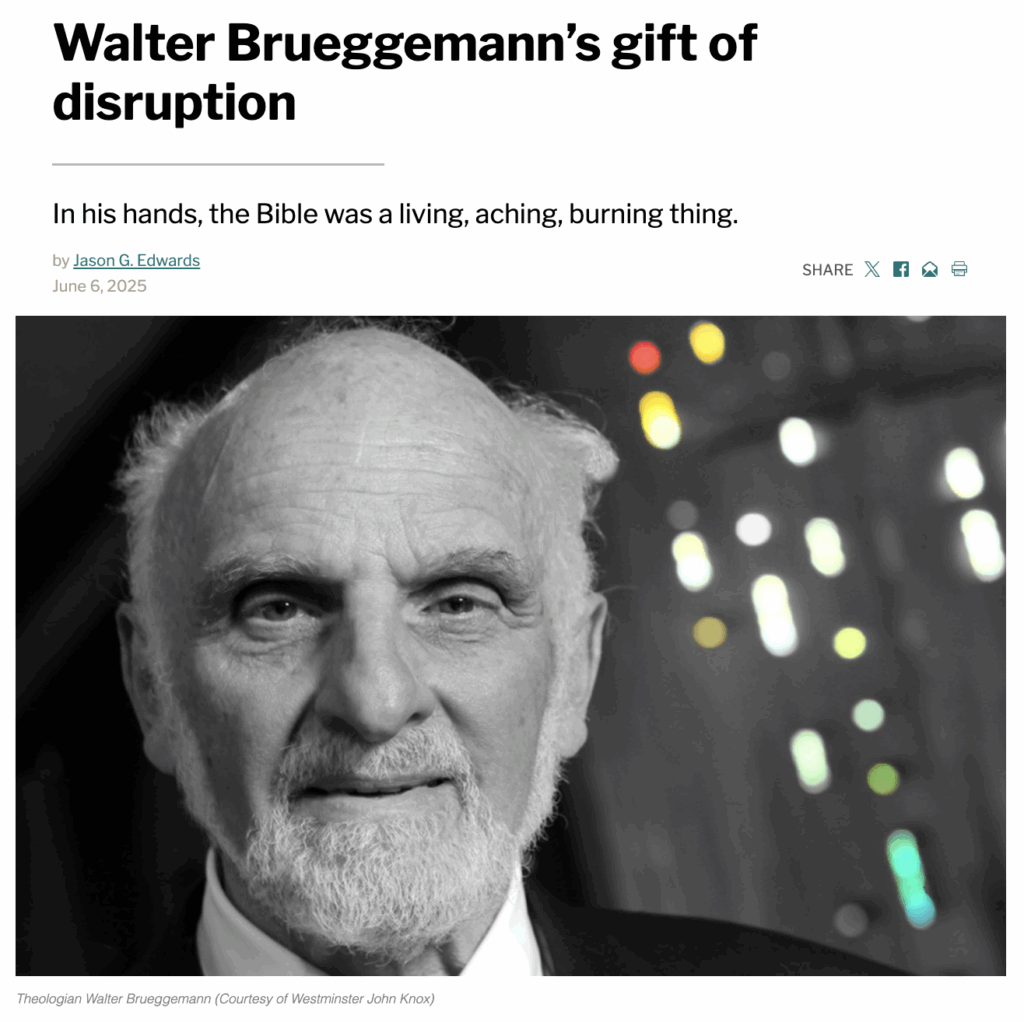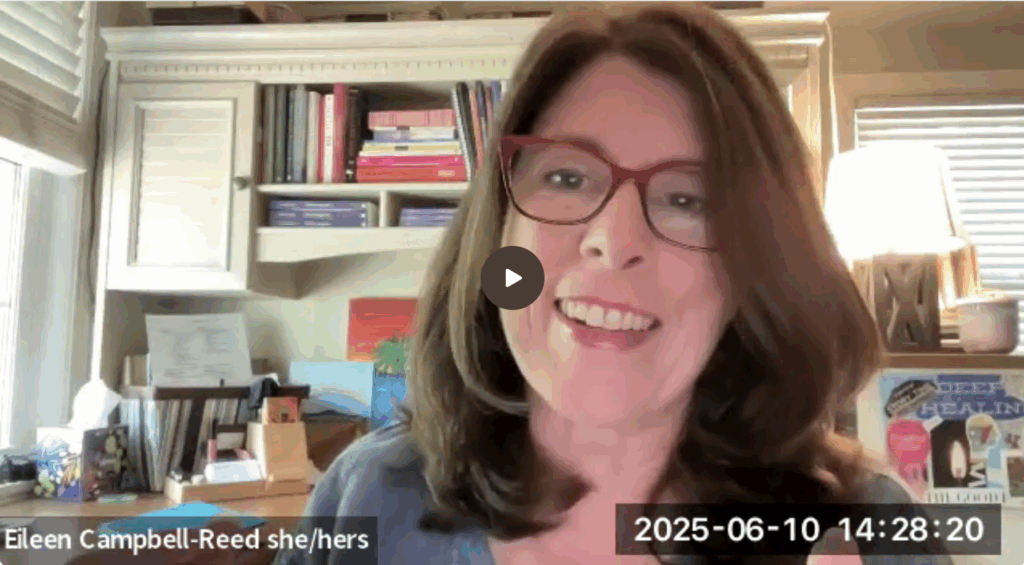In early June three significant public figures in theological education died. Each one contributed through teaching and writing to the education of ministers and the doctoral training of seminary professors. They each held up distinct nodes in the ecology of ministry in the United States. (And they each exerted influence beyond the US.) Today we remember and appreciate Dr. Craig Dykstra, Dr. Toni Craven, and Dr. Walter Brueggemann.
In reverse order, I want to share brief appreciations for Dr. Brueggemann and Dr. Craven, linking to other remembrances. Then I will conclude with my remembrance of Dr. Dykstra.
Rev. Dr. Walter Brueggemann | 1933–2025
“Welcome to your disorientation!” This is how I often greet new students at the start of their first class in seminary. By the time I see them in that first class of a new term, they’ve already attended a week of “orientation.” They have been welcomed in so many ways, but my greeting surprises them and usually produces a laugh. I borrow the phrase from Dr. Walter Brueggemann in his small book Praying the Psalms. He introduces the Psalms and our life of faith using this “simple schematic.”
“Each of God’s children is in transit along the flow of orientation, disorientation, and re-orientation.”[i]
I assure students that life as they were oriented to it may change dramatically. “But please trust the process,” I say. You will also eventually become re-oriented to faith and life.” You can read and download a blessing for starting seminary that begins with “disorientation” here.
Brueggemann is among the most widely known and published scholars of Hebrew Bible in the US over the last 40 or more years. He is so widely known in part because he turned his attention early in his career to sharing his scholarship with pastors, lay people, and seminary students in the most accessible possible ways. I’ve taught his book Praying the Psalms a half a dozen times in the last 15 years. I assign it in the course “Prayer and Pastoral Care.” The insights he offers seem simple, even transparent. Yet they are profound. And often transformative.
His ideas and his influence will continue to live on in his books, and more immediately in the ways he connected and enriched the ecology of theological education through his teaching and relational capacities. Here’s a remembrance of Dr. Brueggemann by a Baptist friend and colleague, pastor Jason Edwards.
Dr. Toni Craven | 1944-2025
Dr. Toni Craven taught for 40 years of Brite Divinity School, Texas Christian University in Fort Worth, Texas. She taught hundreds of ministers and dozens of doctoral students. I invited one of her advisees, Rev. Dr. Stephanie Wyatt to write a remembrance of Dr. Craven.
One of the books that Toni Craven contributed to that I have loved and used many times is Women In Scripture: A Dictionary of Named and Unnamed Women in the Hebrew Bible, the Apocryphal/Deuterocanonical Books, and the New Testament.
She cared deeply about teaching and doing it well. Even more importantly she cared about her learners being able to learn well. She and a colleague, Sherrie Reynolds, write a book in which they said:
Teaching based on the belief that learning is emergent is very different from traditional teaching. The belief that learning emerges reverses the traditional view that teaching causes learning. It suggests, instead, that teaching is a response to learning. Teaching becomes possible when a student encounters a problem, sees a contradiction, or expresses a question. (p. 13)[ii]
How right she was. Teaching doesn’t “cause learning.” It is a far more iterative and responsive process between teachers and learners. How would it revolutionize our classrooms if we started with problems and questions raised by students to set the course of learning each time?
Rev. Dr. Craig Dykstra | 1947-2025
On June 1, Rev. Dr. Craig Dykstra died leaving a legacy to American Christianity that will be hard to measure. His ideas about “pastoral imagination,” formulated in the late 1990s continue to give shape to my vocation, research, and writing more than 25 years later.
Craig Dykstra was Senior Vice President of Religion at the Lilly Endowment and steward of its resources for over two decades (1989-2012). Prior to that he served in congregational ministry and taught at Louisville Presbyterian Seminary and Princeton Theological Seminary. He was an ordained Presbyterian pastor (PC-USA), and Christian educator. He spent his final working years at Duke Divinity School as Research Professor of Practical Theology & Senior Fellow at Leadership Education.
I met Craig Dykstra when I was in my third year of graduate school at Vanderbilt University. I was studying religion, psychology and culture, and I was getting acquainted with the world of theological education as someone who would devote many more years to it myself. As a novice, I had only heard of the Lilly Endowment from people who seemed to hold “the church’s one foundation” with a curious mixture of awe and anxiety. I knew about some of Lilly’s funding for institutes and projects, but not much more. They are indeed among the top philanthropic supporters of church and theological education in the US since their founding in 1937.
“Teaching for Ministry” Year
In the summer of 2003, my course work was complete, and my comprehensive exams seemed far away in the following summer. So I was flexible to say yes, when VDS Dean Jim Hudnut-Beumler and my advisor Bonnie Miller-McLemore approached me with an invitation. They wanted me to work as the graduate fellow for a year-long Lilly Endowment grant called “Teaching for Ministry.” I would work closely with Vanderbilt Divinity School faculty, the Dean, my advisor, and Dr. Patout Burns. We became the four principal investigators for the year-long study grant, meeting every two weeks with a faculty collegium exploring practical theology and doctoral education focused on the practice of ministry.
The Lilly Endowment awarded exploratory grants to a small handful of schools with a track record of preparing practical theologians in their doctoral programs to teach in seminaries. From those grants, Emory launched a program in the study of religious practices and practical theology. Duke designed and initiated a ThD program. Boston University and Princeton Seminary strengthened existing practical theology research and teaching programs.
From the mid 1980s to the early 2000s, Vanderbilt had been training significant numbers of practical theologians who spent careers teaching in seminaries. With faculty leadership from Liston Mills, Volney Gay, Peggy Way, and Bonnie Miller-McLemore in pastoral theology, and David Buttrick, Susan Bond, and John McClure in homiletics, many graduates were taking seminary jobs in these two areas of practical theology.
Launching Our Work
To begin our work, Bonnie, Jim, Patout, and I loaded into Jim’s Murano early one August morning, and we drove from Nashville to Indianapolis. We went to the offices of the Lilly Endowment for a full day of meetings and conversation with Lilly Endowment program officers. We met with John Wimmer, Chris Coble, and Craig Dykstra.
The night I heard that Craig died, I searched my computer and found my notes from that 2003 meeting. These are the (unedited) questions asked to us by Craig Dykstra regarding how our study year might engage churches, congregations, and ministers:
- How do good ministers think?
- What do they do?
- What resources do they depend on?
- What practices do they engage?
- How did they figure these things out?
Then Craig told us about how he had been exploring these questions:
“Six or seven years ago the Lilly [Endowment] utilized the Louisville Institute to call together a ‘pastors working group’ with the help of David Wood. They met two and a half days every six weeks to talk about ‘pastoral excellence’ (a total of eight 3-day sessions). No one had never asked these pastors how they think. Or how do they read a situation. It took them several sessions to build up trust to tell the deeper truths about their experiences.”
Craig has been considering these questions for many years. During those eight consultations with pastors, he coined the term “pastoral imagination” to describe this process by which pastors learn and lead.
Pastoral and Ecclesial Imagination
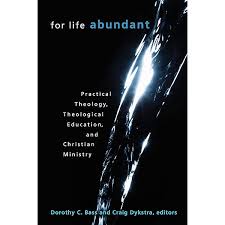 I did not put that term in my notes the day we traveled to the Lilly Endowment. Who knows if he said it? It was another five years before Craig Dykstra’s important essay, “Pastoral and Ecclesial Imagination” came out in For Life Abundant[iii] As he articulated the meaning of pastoral imagination, he pointed to the intangible qualities of pastors who have deep experience in their work, embody habits of being, doing and thinking, and who live into wisdom through pastoral practices that nurture community and vocation. In that chapter he says about pastoral imagination:
I did not put that term in my notes the day we traveled to the Lilly Endowment. Who knows if he said it? It was another five years before Craig Dykstra’s important essay, “Pastoral and Ecclesial Imagination” came out in For Life Abundant[iii] As he articulated the meaning of pastoral imagination, he pointed to the intangible qualities of pastors who have deep experience in their work, embody habits of being, doing and thinking, and who live into wisdom through pastoral practices that nurture community and vocation. In that chapter he says about pastoral imagination:
“Life lived long enough and fully enough in the pastoral office gives rise to a way of seeing in depth and of creating new realities that is an indispensable gift to the church, to all who are members of it, and indeed to public life and to the world” (Dykstra 2008, 50–51).
Challenges
For the next academic year (2003-04), we invited expert scholars and ministry practitioners into a conversation with the bi-weekly faculty collegium at VDS. We engaged in some challenging and provocative conversations about what it means to train professors to teach in seminaries, how best to prepare ministers for their work in congregations and beyond, and how to put better structures in place for both. We faced resistance to sharing one’s teaching, a lack of agreement on definitions of practical theology and ministry, and uncertainty about which philosophical, intellectual, and practical thinkers and ideas ought to guide our work.
At the end of the year our study and dreaming culminated in seeking a much larger grant to expand doctoral education with the aim of preparing better seminary teachers who could support the needs of ministers and churches. Several dozen fellows have entered and graduated from the Program in Theology and Practice at Vanderbilt since 2006. Many are my colleagues and conversation partners. And it was such a delight for me to be, in effect, the first fellow (before there were fellows) and to have such powerful learning set me in a direction that continues to unfold.
Expanding the Ecology of Ministry
A year of working on “Teaching for Ministry” was the most fruitful one of my doctoral education. I was simultaneously doing other integrative work as a pastoral counselor at a recovery center and guiding my congregation in calling new co-pastors. These three tasks of the faculty collegium, pastoral counseling, and chairing a pastor search, pushed me hard toward turning everything I had read and learned in classrooms into on-the-ground realities. It put me on a path, a learning trajectory, which I am still exploring.
Across the next five years I passed my exams, finished my dissertation, studied clergywomen in Baptist life, and ended up on the precipice of a major recession and downturn of the economy in 2008. Nevertheless, I was offered the one job for which I interviewed. And I became one of the research partners in the Learning Pastoral Imagination Project.
My research partner Chris Scharen finished his doctoral work in 2003 and become a pastor in New England. He soon came to Craig Dykstra’s attention. Their friendship and collegiality led eventually to the LPI Project grant to study how pastors learn in practice. The same questions that Craig asked our VDS study team in 2003, now continue guiding the LPI research and publications.
When I say Craig Dykstra has shaped the trajectory of my research, publication, teaching, and mentoring for ministry, and the scholarship of pastoral imagination, I’m not kidding. Much has been indirect. The influence has come through a vast web that is the ecology of ministry. Craig Dykstra’s influence came through his writing, relationships, and grantmaking to an untold number of others who in turn have influenced me. And that is how a good ecology for a good practice like ministry works. The flow of ideas and learning, conversation and expansive imagination.
A Legacy of Pastoral Imagination
Today I am delighted to honor Craig Dykstra’s memory. I appreciate his good questions and insistence on careful thoughts and responses. I could tell many more stories about how that work has unfolded in my thinking and my life.
A few days ago, Chris interviewed me about what I’ve been doing lately in teaching and in helping theological schools revise their teaching. Despite many internal and external pressures on theological education in 2025, questions Craig asked long ago remain urgent and important if we are to do our work well.
Here’s my conversation with Chris. He also shares some appreciations for Craig Dykstra on his new substack “Loaf and Leaven.”
Leaven & Loaf Substack with Chris Scharen
Blessings and Peace
In a few days, I will travel again to Indianapolis, as I did 22 years ago. This time I will attend Craig Dykstra’s funeral.
“Pastoral imagination is not something to be achieved or attained. It comes as a gift.” (Dykstra 2008, 55).
Thank you, Craig Dykstra, for sharing your gifts with us generously. Thank you for embracing a vision of life abundant. Now as you are gathered into the fullness of the life of God, may you be overwhelmed with the abundance of love, grace, generosity, and belovedness that Christ embodied. The very same to which you were called.
[i] Walter Brueggmann, Praying the Psalms: Engaging Scripture and her Life of the Spirit, Second Edition (Eugene, Oregon: Cascade Books, 2007).
[ii] Sherrie Reynolds and Toni Craven, Higher Education Reconceived: A Geography of Change (Fort Worth, Texas: TCU Press, 2009). ISBN 0-875-65391-X.
[iii] Dykstra, Craig. “Pastoral and Ecclesial Imagination.” In For Life Abundant: Practical Theology, Theological Education, and Christian Ministry, eds.Dorothy C. Bass and Craig Dykstra, 41–61. Grand Rapids, Mich.: Eerdmans. 2008.

